Are the Stansted 15 being treated like terrorists?
- Published
The Stansted 15 broke through a fence at the airport in an attempt to reach a jet taking 60 people to three African nations
Clip, clip, clip go the cutters as the perimeter fence is cut. "Go, go, go!" says a man in the dark and rain - and 15 anti-deportation campaigners break into Stansted Airport in March 2017.
Minutes later, they reached stand 505, where a jet was preparing to transport some 60 people to Nigeria, Ghana and Sierra Leone.
All the passengers were being removed from the UK by the Home Office after it deemed they had exhausted their rights to remain in the country.
Before the police and security knew it, the protesters surrounded the jet. Four of them used a sophisticated set-up to lock themselves together around the nose wheel.
And that's where they remained all night.
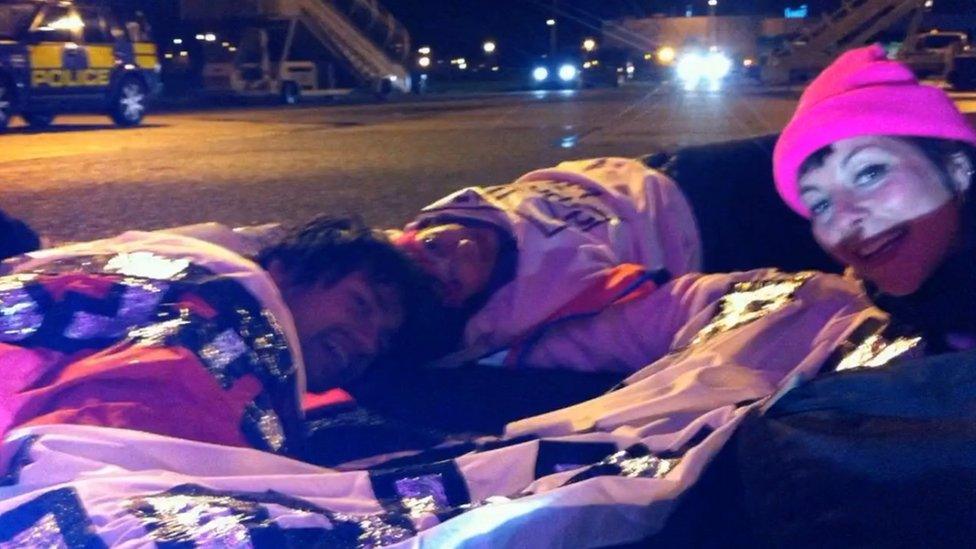
The campaigners say they were guilty of nothing more than a peaceful protest
The campaigners stopped the flight because they believed that the removals were unjust. Many of those on board had not had a final decision in their case and were being subjected to a now-abandoned policy of "deport first, appeal later".
But while they may feel vindicated, all of the 15 are today convicted criminals after a jury unanimously found they were guilty of the serious offence of disrupting an airport.
The campaigners say they were guilty of nothing more than a peaceful protest - they would occasionally have a singalong during the long damp hours. Their conviction for what they say is a terrorism-related offence is a massive abuse of process, they claim.
What's the truth?
The Stansted 15 prosecution appears to set a legal precedent.
Civil disobedience, or "direct action", has long been part of the British tradition of radical political protest.
But when protesters interfere with the rights of others - such as laying down in front of a bulldozer that has permission to tear down trees for a road - the police tend to reach for the relatively minor offence of aggravated trespass.
And that's been the charge used against other political protesters at airports.
After being carted off by Essex Police, the Stansted 15 were also charged with aggravated trespass, which can lead to up to three months in jail.
But four months later, the Crown Prosecution Service charged all of them with the far more serious offence of endangering safety at an aerodrome.
And in extreme circumstances this can lead to a life sentence.
Is this a terrorism offence?
The short answer is no - but it can be, in some circumstances.
In 1990, Parliament passed the Aviation and Maritime Security Act. That was part of an internationally-agreed plan by governments to toughen up global airport security.
The 1970s and 80s had seen a series of hijackings - and the the law had terrorism squarely in its sights.
Ministers and MPs debated and approved the legislation in the wake of the Lockerbie bombing, in which an airliner was brought down while flying over the Scottish town.
But here's the thing: the eventual legislation doesn't mention terrorism at all.
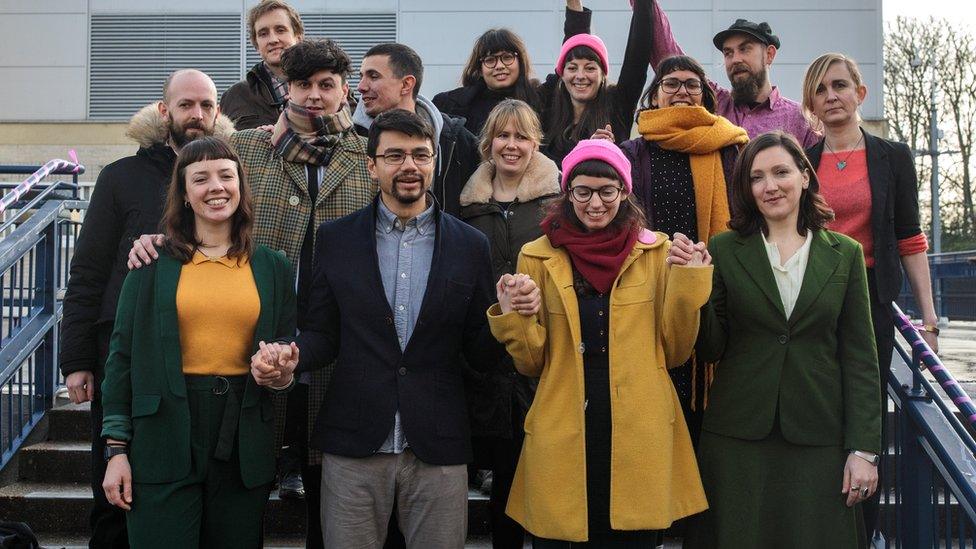
Lawyers for the 15 insist they will be proved right at the Court of Appeal
It describes the crime as disrupting the services of an airport in such a way as to "endanger or be likely to endanger" its safe operation.
In other words, it goes far wider than simply targeting groups that are ideologically bent on violence to achieve their aims.
David Anderson QC, the former terrorism laws watchdog, says the offence isn't a terrorism crime - unless the prosecutors say so when they bring the case to court. This is similar to crimes like murder or kidnapping, where a terrorism motive can be shown to the jury and influence the sentence.
The Stansted 15 jury was not told by prosecutors that the defendants were alleged terrorists - or that their break-in amounted to terrorism. Crucially, the UK's specialist counter-terrorism prosecution unit did not run the case - nor did the CPS call in specialist barristers who manage these sensitive cases.
So it's simply not the case that the 15 were convicted as terrorists on a terrorist charge.
Was this an excessive prosecution?
During sentencing mitigation, Kirsty Brimelow QC - one of the country's top human rights barristers - told the judge he needed to balance protecting the airport with the rights of the defendants to take part in political protest.
Ms Brimelow argued the courts had long respected the tradition of political resistance and civil disobedience, saying handing substantial sentences to protesters would seriously interfere with the demonstrators' rights.
Judge Morgan said he acknowledged those arguments, but the jury were sure that the 15 had endangered the safety of Stansted.
The protesters had cut through the perimeter after dark - triggering a major security operation. Police scrambled a helicopter because they did not know who else was "airside" and what they had with them. Nobody knew if a foreign object had been left in a location where it could be sucked into a jet engine with devastating consequences.
"Prosecutors select charges which reflect the seriousness and extent of the offending on the facts of each individual case and give the court adequate powers to sentence," says Chris Long, chief crown prosecutor at CPS South East.
"The evidence in the case supported the charge - that their actions were likely to risk the safe operation of the aerodrome."

Who was on the flight the Stansted 15 stopped?
Approximately 60 passengers being removed from the UK.
The majority were being deported for immigration reasons, including some who claimed their asylum cases had been unfairly dealt with and were appealing.
The campaigners say that 11 of the 60 remain in the UK to this date - and two have won the right to stay indefinitely - showing their action was justified. Two of the 11 were victims of a human trafficking gang.
Twenty-five of those on board were convicted foreign national prisoners who were being deported following the end of their sentence.
One of them was convicted murderer Quam Ogumbiyi who remained a danger even in jail: He was part of an attack on a Serbian war criminal in Wakefield prison in 2010.

During the demonstrators' trial, the jury heard the airport's operations chief felt he had no choice but to close the runway for more than an hour while staff carried out a costly security sweep.
As well as the delays to take-offs, 23 incoming Ryanair and EasyJet flights were diverted to Luton, Birmingham, East Midlands, Gatwick and Bristol.
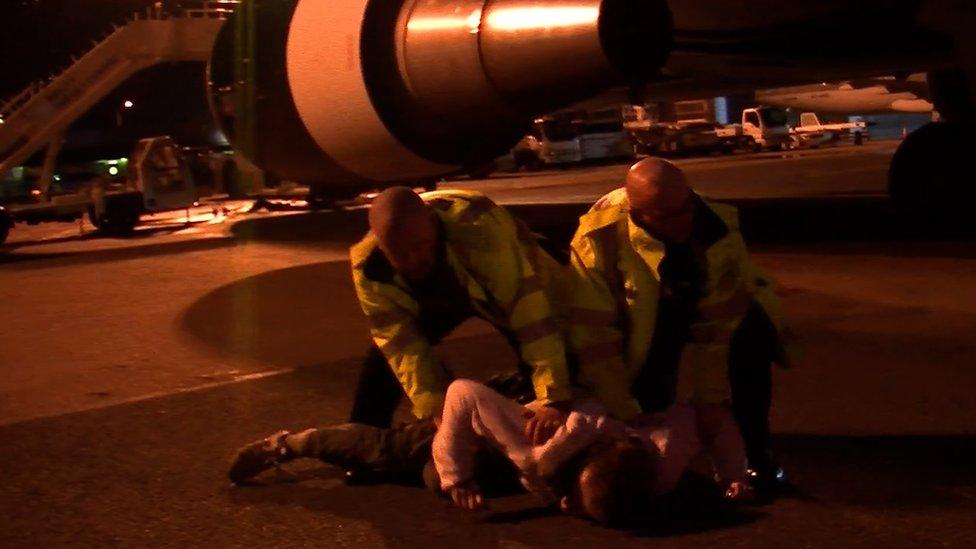
The 'Stansted 15' prosecution appears to set a legal precedent
Ten were then refuelled so they could take off again for Stansted - while seven plane loads of passengers had to sit on buses back to where they should have landed.
All of this evidence together, the CPS argues, amounted to a serious risk to public safety that justified asking the attorney general to approve charging the 15 with the far more serious offence.
The defendants argued during their 42-day trial that their actions were justified: that even if they had technically broken the law, they had a good reason for doing so.
But the judge told the jury they could not consider that defence - and so for this, and other reasons, lawyers for the 15 are seeking to overturn the convictions in the Court of Appeal.
- Published8 January 2019
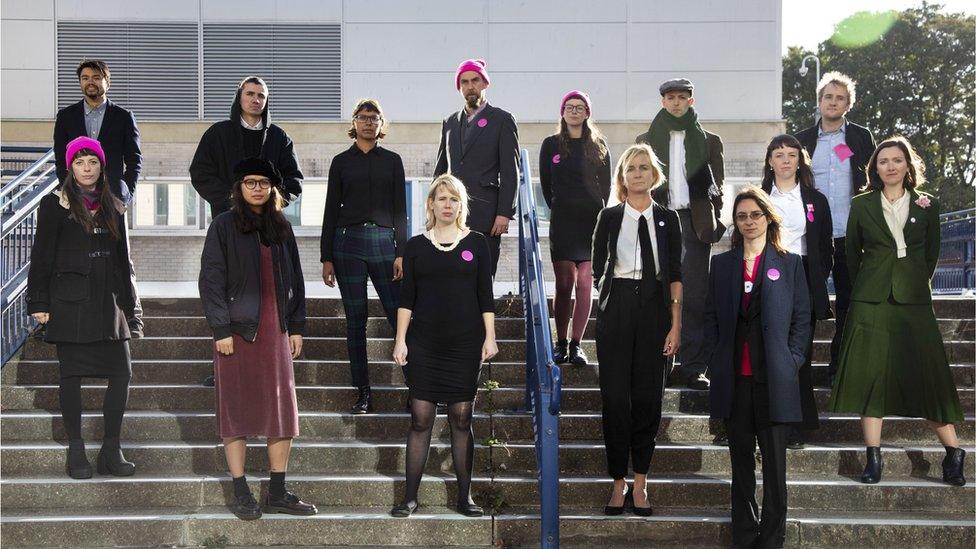
- Published6 November 2018
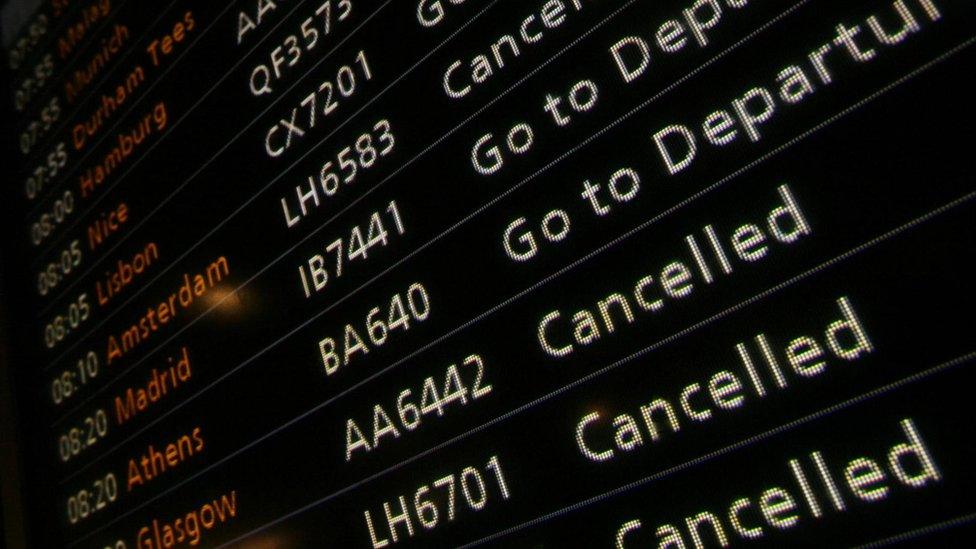
- Published2 October 2018
